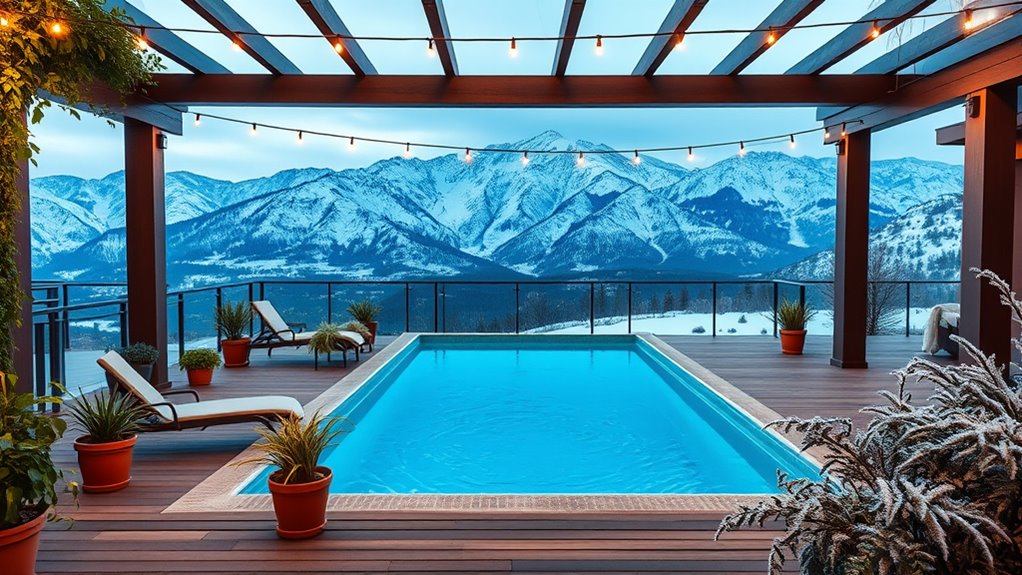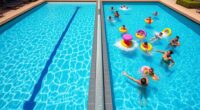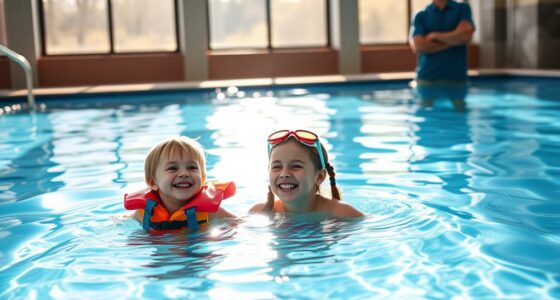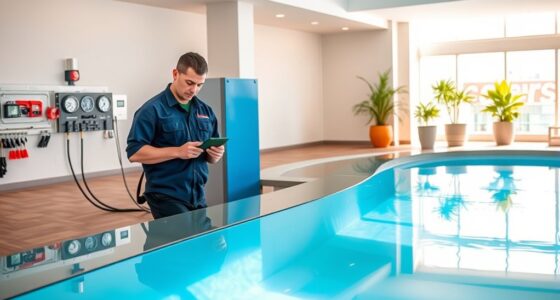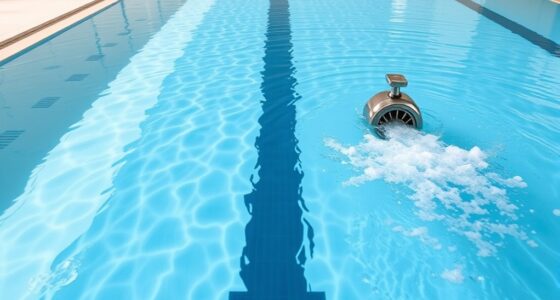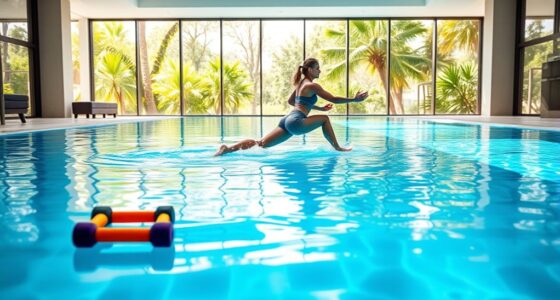Yes, you can use your endless pool all year if you plan carefully. Choose a sheltered, flat spot close to power and water sources, and add good insulation and a sturdy cover to keep heat in. Use an efficient heater and consider weather protection like windbreaks and enclosures. Regular maintenance and adjusting your schedule based on the season will keep your pool comfortable. Keep going to discover how to make year-round swimming seamless and enjoyable.
Key Takeaways
- Properly insulate and cover the pool to retain heat and protect against weather elements year-round.
- Install efficient heating systems, like heat pumps or gas heaters, to maintain comfortable water temperatures in all seasons.
- Create a sheltered environment using enclosures, awnings, or windbreaks to reduce exposure to cold and wind.
- Regularly perform maintenance, including chemical balancing and equipment checks, to ensure safe, continuous use.
- Adjust usage and safety precautions based on seasonal conditions, such as shorter swims in winter and increased outdoor activity in summer.
Choosing the Right Location for Year-Round Use
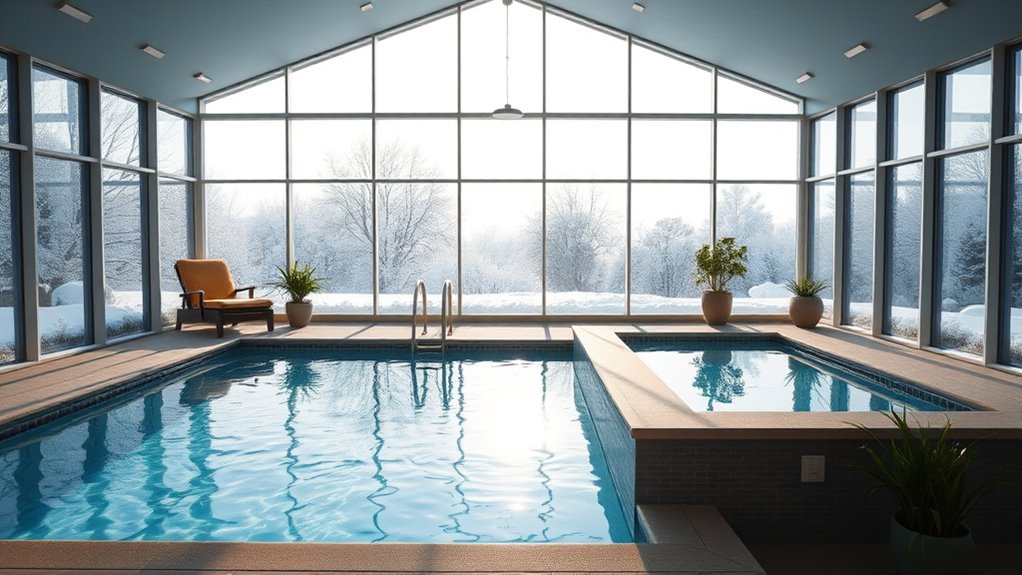
Selecting the ideal location for your endless pool is essential to enjoying year-round use. You want a spot that offers protection from harsh elements while being easily accessible. Choose a flat, stable surface to guarantee proper installation and safety. Consider placing your pool close to your home for convenience, which also helps in maintaining warmth and protecting it from wind. Ensure the area has enough space around the pool for safe entry, exit, and maintenance. Think about natural shade options, like trees or awnings, to reduce direct sunlight. Keep in mind that proximity to power sources and water supply is vital. A well-chosen spot minimizes weather-related issues and makes year-round swimming more practical and enjoyable. Proper planning can also help mitigate climate considerations that affect outdoor pools throughout the year.
Ensuring Proper Insulation and Covering Strategies
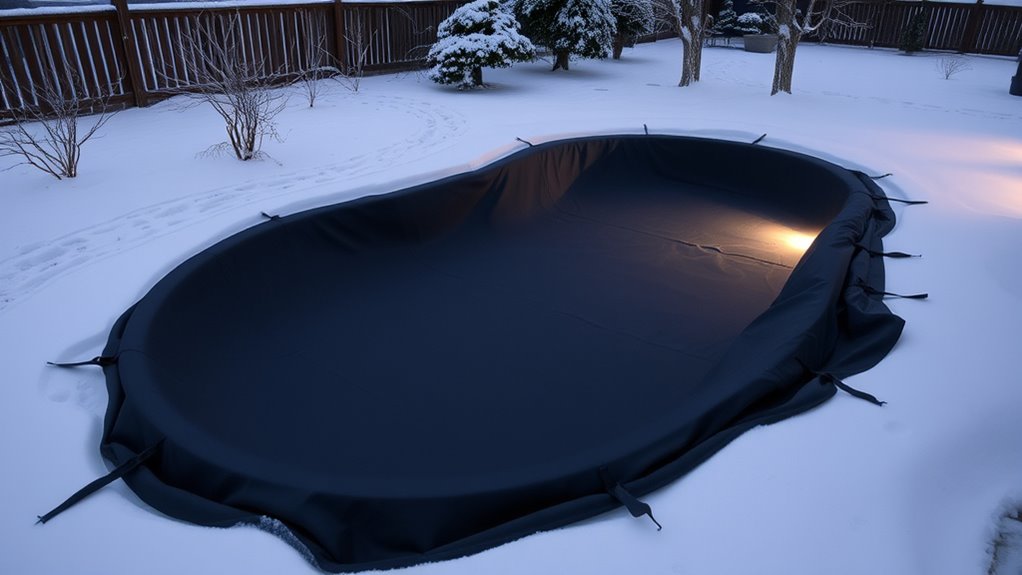
To keep your endless pool comfortable and energy-efficient year-round, proper insulation and covering strategies are essential. Start by insulating the pool’s walls and floor with high-quality materials designed for outdoor use, reducing heat loss and keeping water warmer in winter. Invest in a durable, insulated pool cover to retain heat when the pool isn’t in use. Ensure the cover fits snugly to prevent heat escape and debris from entering. Additionally, consider using windbreaks or fencing around the pool to minimize heat loss caused by wind exposure. Regularly inspect and replace worn or damaged covers to maintain efficiency. Proper insulation and covering not only save energy but also extend your pool’s lifespan, making year-round use more practical and cost-effective. Understanding total-cost clarity in pool maintenance can help you budget for ongoing insulation and cover replacements to optimize performance.
Maintaining Optimal Water Temperature in Cold Months
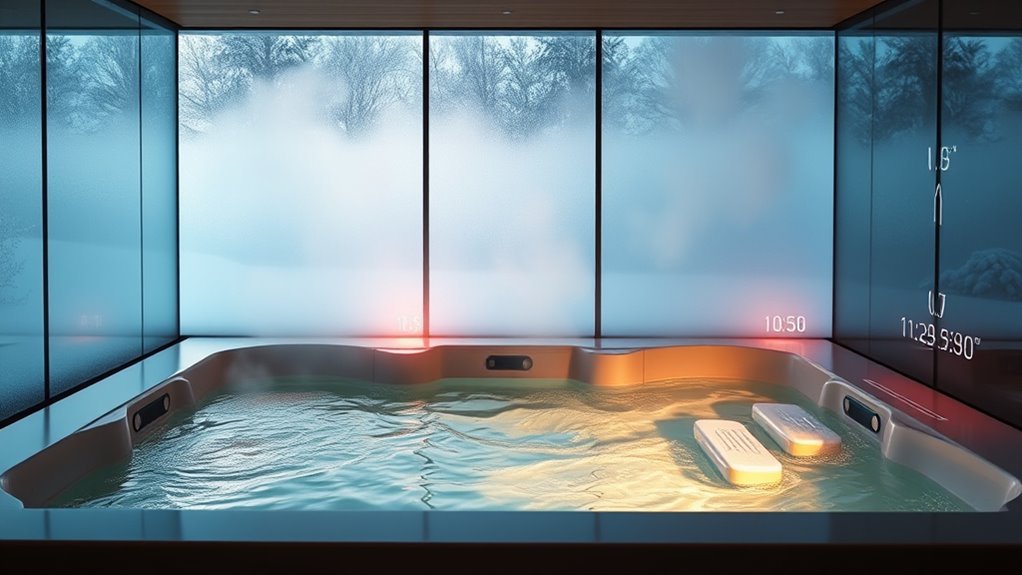
To keep your pool warm during colder months, you need to use your pool cover effectively to retain heat. Adjust your heater settings to match the outdoor temperatures, and consider insulating your pool structure for extra efficiency. These steps help maintain a comfortable water temperature all year round. Additionally, implementing advanced fraud detection techniques can help protect your transactions and financial information during the process.
Using Pool Covers Effectively
During the colder months, using a pool cover effectively is essential for maintaining a comfortable water temperature and reducing energy costs. Make sure your cover fits snugly over your Endless Pool to minimize heat loss. Remove any debris or dirt before covering the pool to ensure a tight seal. Keep the cover clean and in good condition—damaged covers won’t insulate properly. When not in use, always keep the cover on to retain heat and prevent evaporation. Consider using a thermal or insulated cover for added efficiency. Regularly check for gaps or tears that could let out heat. Additionally, choosing trustworthy brands known for quality ensures better durability and insulation performance. By consistently using your pool cover correctly, you’ll maximize warmth, cut down on energy bills, and enjoy a more comfortable swimming experience all year round.
Adjusting Heating Settings
Adjusting your heating settings is key to maintaining a comfortable water temperature during the cold months. You want consistent warmth without wasting energy. First, set your heater to your ideal temperature—typically between 78°F and 82°F. Monitor water temperature regularly and make small adjustments as needed. Use a timer to prevent overheating or unnecessary energy use during off-peak hours. Consider lowering the temperature slightly at night to save energy while maintaining comfort. Here’s a quick guide:
| Temperature Adjustment | When to Change | Energy Impact |
|---|---|---|
| Increase by 2°F | Cold spells | Higher energy use |
| Decrease by 2°F | Mild days | Lower energy use |
| Maintain current temp | Stable weather | Consistent comfort |
| Use timer settings | Night/away | Save energy |
Fine-tune these settings based on your comfort and energy goals. Regularly checking and adjusting your settings can also help prevent unnecessary energy waste and ensure you enjoy your pool year-round.
Insulating Pool Structure
Insulating your pool structure is essential for retaining heat and reducing energy costs during the cold months. Proper insulation keeps the warm water from losing heat to the environment, so your heater doesn’t have to work as hard. You can insulate the pool walls with foam boards or specialized pool insulation panels, ensuring all sides are covered. Additionally, insulating the pool’s perimeter and the equipment area helps maintain a consistent temperature. Consider using a pool cover when not in use; it acts as an extra barrier against heat loss. Keep in mind that well-insulated pools stay warmer longer and require less energy to maintain a comfortable temperature, saving you money and making year-round use more practical.
Upgrading Your Pool’s Heating System
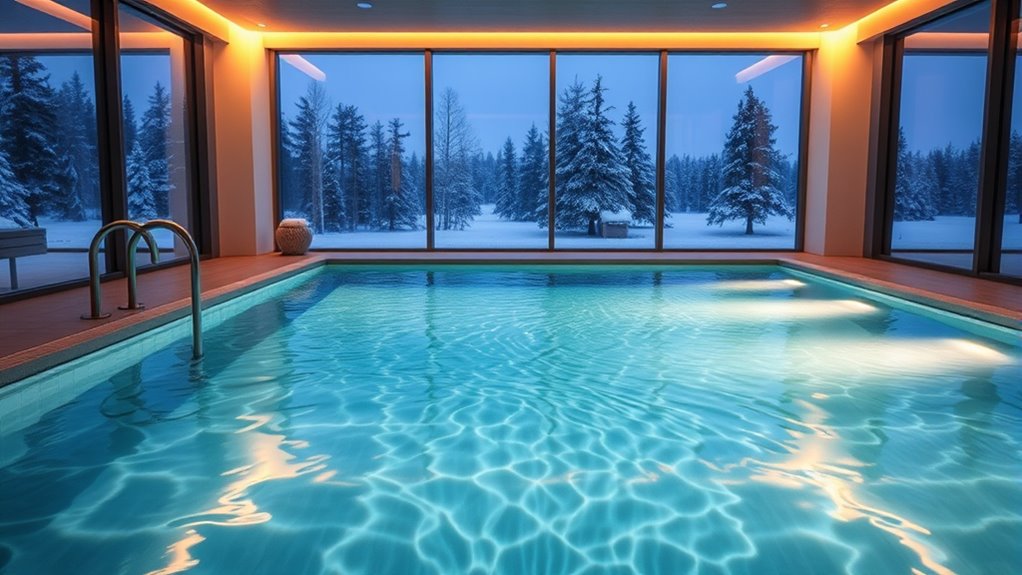
Upgrading your pool’s heating system can make a big difference in comfort and efficiency. You should consider choosing energy-efficient options that save you money while keeping the water just right. Proper maintenance will help you maintain ideal water temperature all year round without unnecessary hassle. Additionally, selecting a heat pump with advanced noise reduction technology ensures quiet operation, making your swimming experience more enjoyable throughout all seasons.
Choosing Efficient Heating Options
Choosing the right heating system can substantially impact your pool’s energy efficiency and running costs. You’ll want to deliberate on options like heat pumps, gas heaters, or electric resistance heaters, each with their pros and cons. Heat pumps are highly efficient and cost-effective over time but work best in moderate climates. Gas heaters heat quickly and are better for colder environments, though they cost more to operate. Electric resistance heaters provide rapid heating but tend to be less efficient and more expensive to run long-term. When selecting a system, think about your climate, how often you’ll use the pool, and your budget. Investing in a high-quality, energy-efficient heater can make year-round swimming more affordable and sustainable.
Maintaining Optimal Water Temperature
To keep your pool comfortable year-round, maintaining a consistent water temperature is essential, and upgrading your heating system can make a significant difference. A reliable heater guarantees your water stays at the ideal temperature, whether you’re swimming in winter or chilly months. Modern options like heat pumps or high-efficiency gas heaters provide fast, consistent heat while saving energy. Regularly monitoring your pool’s temperature helps prevent overheating or cooling, which can be uncomfortable or damage your equipment. Insulating your pool and piping minimizes heat loss, keeping temperatures steady and reducing energy costs. Additionally, understanding the different personality traits can help you select the most effective way to operate and maintain your pool environment for maximum comfort. By investing in a quality heating system and maintaining it properly, you’ll enjoy a warm, inviting pool no matter the season, extending your swimming comfort and enjoyment throughout the year.
Implementing Effective Weather Protection Measures
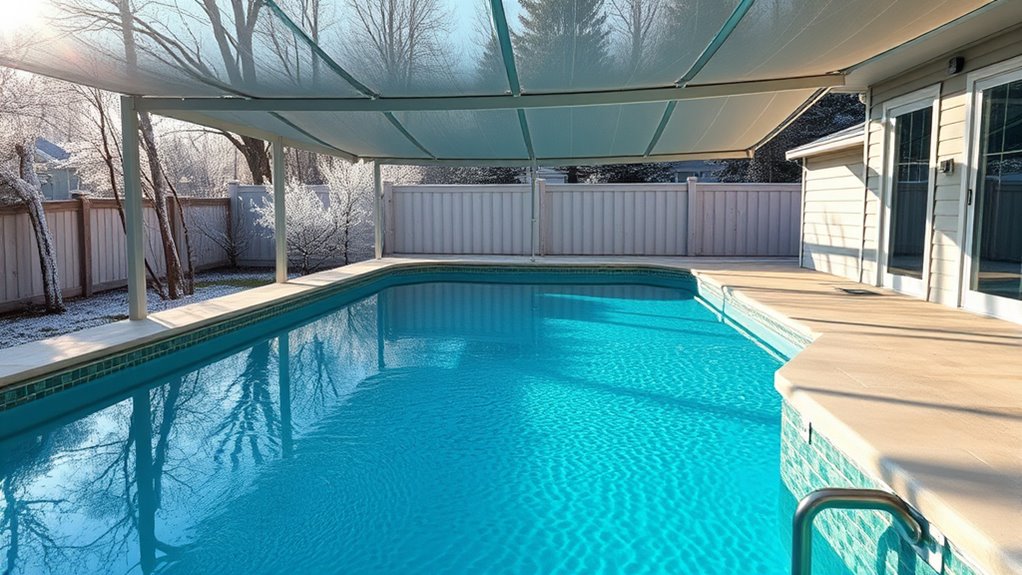
Protecting your endless pool from harsh weather conditions is vital to guarantee year-round enjoyment and longevity. Installing a sturdy, weather-resistant cover is the first step—it shields the water from debris, snow, and excessive sun exposure. Consider adding side enclosures or a pergola with a retractable canopy to provide extra protection during storms or heavy rain. Insulating the pool’s exterior helps maintain water temperature and prevents heat loss, reducing energy costs. If you live in a particularly cold climate, think about enclosing the area with windbreaks or barriers to block chilly gusts. Regularly removing snow and ice from the cover prevents damage and guarantees safe access. Using specialized filtration units can help keep the water clean and clear despite exposure to outdoor elements. Implementing these weather protection measures keeps your pool in top condition and ready for use, regardless of the season.
Regular Maintenance and Equipment Checks
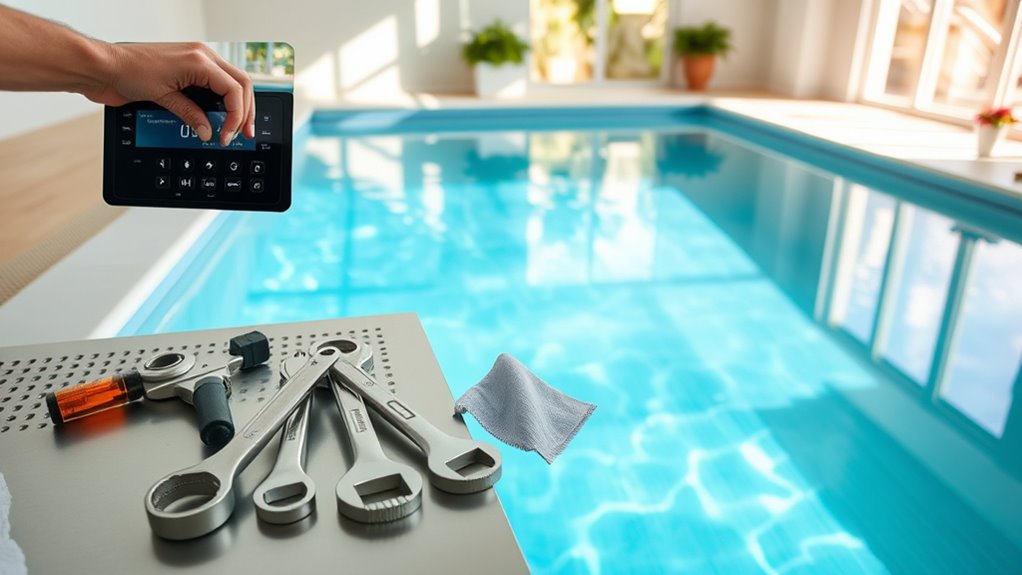
Regular maintenance and equipment checks are essential to guarantee your endless pool operates efficiently and safely. You should regularly inspect the filter system, ensuring it’s clean and functioning properly. Replace or clean filters according to the manufacturer’s recommendations to prevent buildup that can impair water flow. Check the pump and heater for leaks or unusual noises, signaling potential issues early. Test the chemical levels weekly to maintain proper water balance, preventing algae growth and corrosion. Inspect the liner and surfaces for cracks or wear, addressing problems before they worsen. Keep an eye on the control panel for error messages or malfunctions. Performing these checks consistently helps extend your pool’s lifespan, keeps the water safe, and guarantees a smooth, enjoyable swimming experience year-round. Additionally, monitoring sound vibrations and frequencies can support the overall health of your pool equipment by reducing noise and vibrations that may cause wear over time.
Adjusting Usage Schedules According to Seasons
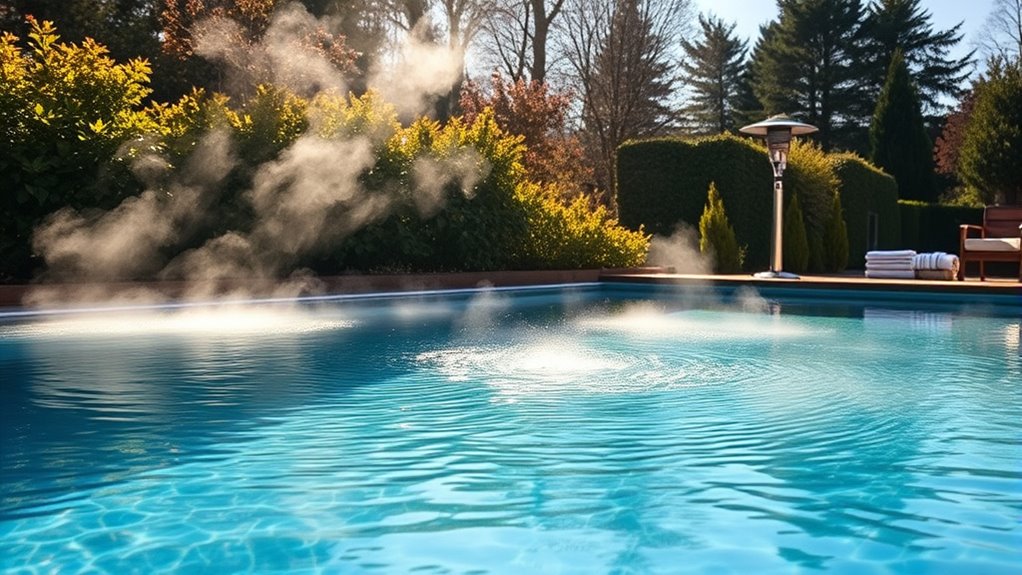
Adjusting your pool usage schedule according to the seasons guarantees you make the most of your endless pool year-round. During warmer months, you can swim more frequently and for longer sessions, maximizing outdoor use. In colder seasons, consider shorter, more frequent swims or indoor sessions if possible. To help visualize, here’s a sample schedule:
| Season | Recommended Use | Tips |
|---|---|---|
| Summer | Daily, extended swims | Use outdoor, keep hydrated |
| Fall | 3-4 times per week | Adjust for cooler weather |
| Winter | 2-3 shorter sessions | Use indoor or heated pool options |
Being aware of seasonal changes and adjusting your usage schedule accordingly can help maintain your swimming routine and ensure safety and comfort throughout the year.
Safety Tips for All-Season Swimming Enjoyment
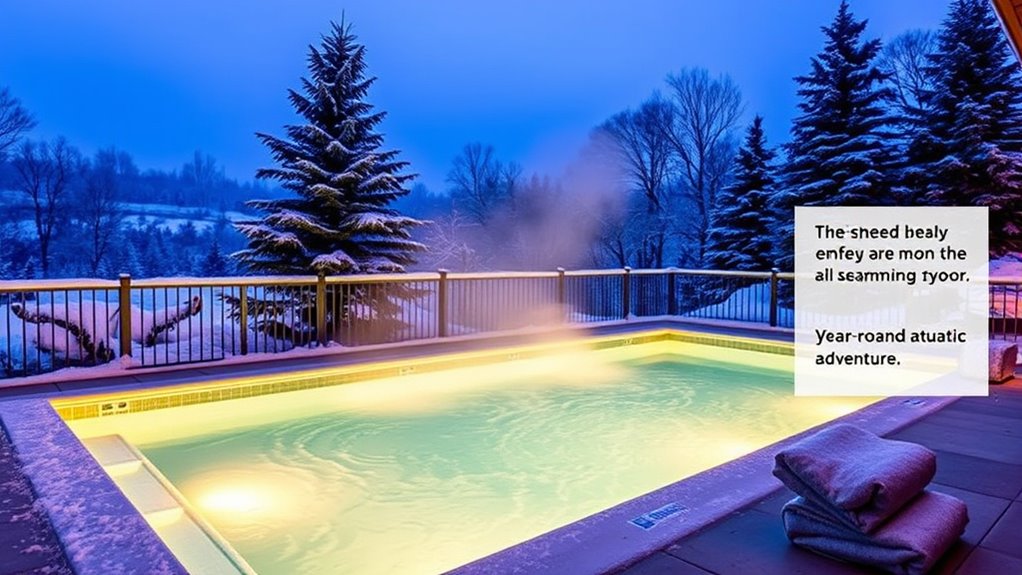
Swimming safely throughout the year requires awareness of seasonal hazards and proactive precautions. Always check the water temperature before swimming; extremely cold or hot water can cause health issues. Wear appropriate gear, like thermal suits in winter or UV-protective swimwear in summer. Keep the pool area well-lit and free of clutter to prevent slips and falls. Use safety covers or fences when the pool isn’t in use, especially during colder months. Never swim alone—having a buddy ensures help is nearby if needed. Regularly inspect your pool equipment and maintain proper chemical levels to prevent bacteria growth. Listen to your body and avoid swimming if you’re feeling unwell or overly tired. Following these tips helps you enjoy your endless pool safely, no matter the season.
Frequently Asked Questions
Can an Endless Pool Be Used Comfortably During Extreme Weather Conditions?
Yes, you can use an endless pool comfortably during extreme weather conditions. You simply need to guarantee proper insulation, such as a sturdy cover or enclosure, to keep the water warm and prevent heat loss. Additionally, installing a reliable heater helps maintain a comfortable temperature regardless of outside weather. With these measures, you can enjoy your pool year-round, whether it’s freezing cold or scorching hot outside.
What Are the Best Accessories to Extend Pool Usability in Winter?
You can extend your endless pool’s usability in winter with the right accessories. Invest in a high-quality winter cover to keep debris out and maintain warmth. Use a pool heater, like a solar or electric one, to keep the water comfortable. Consider insulated pool panels for added protection against the cold. Ultimately, install a windbreak or enclosure to reduce heat loss and create a cozy, year-round swimming environment.
How Does Ambient Temperature Affect Pool Water Heating Efficiency?
Ambient temperature greatly impacts your pool’s heating efficiency. When it’s colder outside, your heater works harder to maintain your desired water temperature, using more energy. Conversely, warmer air temperatures help your heater operate more efficiently, saving you money. To optimize heating, consider installing a cover and using a pool heater with good insulation. Monitoring outdoor conditions allows you to adjust your heating schedule, ensuring comfort without wasting energy.
Are There Specific Safety Precautions for Winter Swimming in an Endless Pool?
Winter swimming in an endless pool is like stepping into a brave new world, so safety is key. You should wear a warm hat, gloves, and a wetsuit if needed, and limit your time to prevent hypothermia. Always have a buddy nearby, keep a towel and warm clothes close, and guarantee the water remains at a safe, comfortable temperature. Listen to your body and exit if you start feeling too cold.
What Are the Long-Term Energy Costs of Year-Round Pool Operation?
Your long-term energy costs for year-round pool operation depend on factors like pool size, insulation, and heating methods. You’ll likely see higher bills if you heat the water constantly, but using energy-efficient equipment and proper insulation can reduce expenses. Regular maintenance and adjusting temperature settings also help. By planning ahead and choosing eco-friendly options, you can enjoy your pool year-round without draining your wallet.
Conclusion
With the right planning, your endless pool can be a year-round oasis, turning every season into a personal retreat. Think of it as your private sanctuary—an unending invitation to swim whenever you desire. By choosing the right location, insulating properly, and maintaining your system, you hold the key to endless aquatic bliss. So why wait? Plunge into year-round swimming and let your pool become the heart of your home, no matter the weather.

